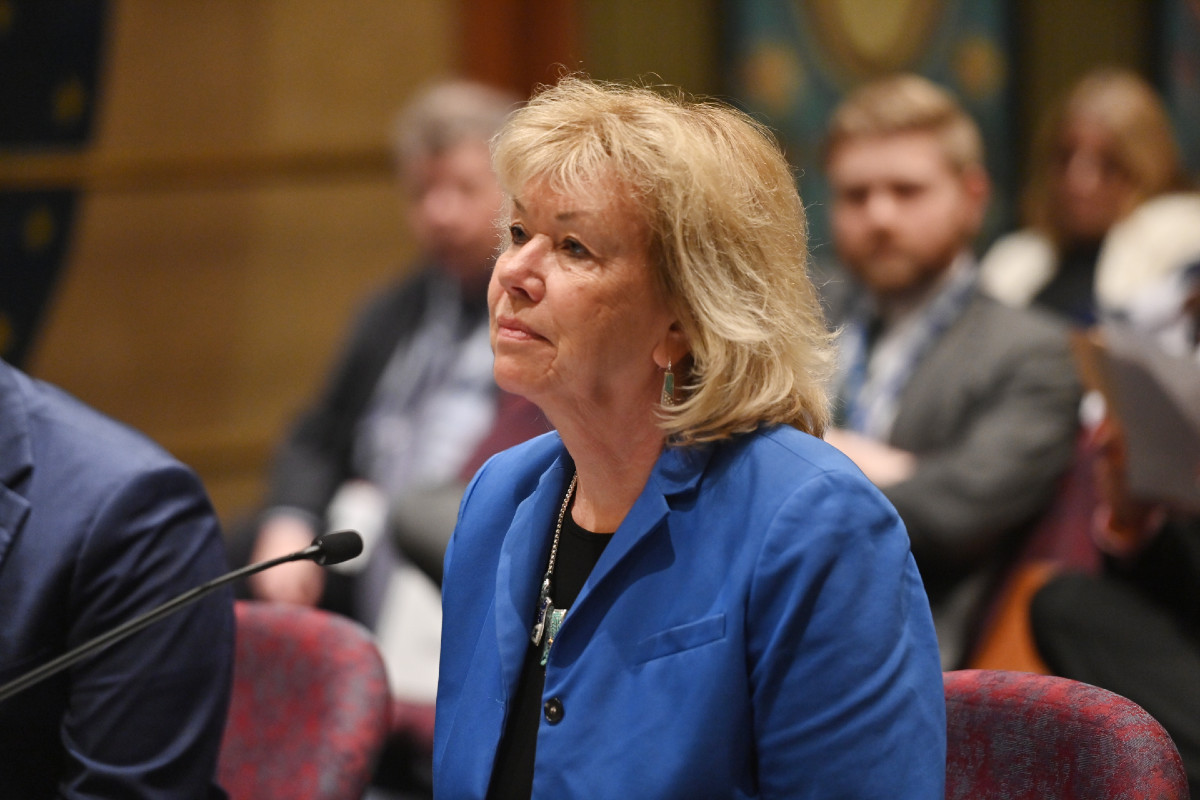Morrison law strengthens Illinois’ response to human trafficking
- Details
- Category: News

SPRINGFIELD — Illinois has identified thousands of human trafficking victims in recent years, though officials believe the actual number is significantly higher. A new law sponsored by State Senator Julie Morrison aims to transform the state's response to trafficking cases by enabling faster victim identification and enhancing survivor support through improved coordination, training and services.
“This law reflects extensive collaboration between Illinois State Police, state agencies and lawmakers to address existing gaps in our current systems,” said Morrison (D-Lake Forest). “By improving communication between agencies, we can ensure survivors receive compassionate support more quickly while making it harder for trafficking networks to operate within our state.”
The new law takes a victim-centered, trauma-informed approach to addressing human trafficking. The law builds on recommendations from the Joint Human Trafficking Working Group — created in 2023 with input from over 60 stakeholders and state agencies — and lays out a statewide strategic plan to support trafficking survivors. This includes creating standards of care for medical and legal providers and building a network of accessible services.
Under the new law, training will expand for staff in the Illinois Department of Children and Family Services, Department of Human Services, Department of Juvenile Justice and Department of Corrections to improve the ability to identify and support trafficking victims — particularly youth in state care. It also strengthens screening procedures for at-risk individuals within the justice system.
To improve investigations, the law supports the creation of multidisciplinary task forces to help law enforcement coordinate across jurisdictions. It also eliminates the 25-year statute of limitations for trafficking survivors, allowing survivors who were trafficked as minors to seek justice at any point in their healing process.
“Too often, survivors slip through gaps in our system because agencies work in isolation,” said Morrison. “This law will enable the state to build an integrated, responsive network that delivers real support to trafficking survivors.”
Senate Bill 2323 take effect Jan. 1, 2026.
Morrison applauds $120 million Monsanto settlement to address environmental health risks
- Details
- Category: News

DEERFIELD – State Senator Julie Morrison commends the Illinois attorney general for standing up for Cook and Lake Counties after the announcement of a landmark settlement requiring Monsanto to pay $120 million for polychlorinated biphenyl – also known as PCB – contamination to the region.
“This settlement represents a critical step toward environmental justice for Illinois families who have lived with the consequences of corporate negligence for far too long,” said Morrison (D-Lake Forest). “For decades, Monsanto produced and disposed of dangerous chemicals while denying their devastating health impacts. This agreement holds them accountable and secures vital funding to protect our communities and natural resources.”
The settlement resolves a 2022 lawsuit filed by Illinois Attorney General Raoul alleging that Monsanto officials knew PCBs posed serious health and environmental risks even as they denied those dangers publicly. PCBs, banned in 1979 due to their high toxicity, are believed to cause cancer and multiple other illnesses and do not break down easily in the environment.
Under the agreement, Glencoe, Lake Bluff, Lake Forest, North Chicago, Winnetka, and a number of other communities will receive $80 million collectively, with an additional $40 million or more to be determined by further legal action. The settlement funds must be used strategically to address contamination, support affected communities, and prevent future environmental disasters.
“While no amount of money can undo the health impacts suffered by families exposed to these carcinogens, this settlement will help provide meaningful resources for cleanup, monitoring and community health initiatives," said Morrison. "I commend Attorney General Raoul for his persistent pursuit of justice and his commitment to protecting Illinois residents and our natural environment.”
Morrison has been instrumental in protecting environmental health risks, most recently leading House Bill 2516 – a law to ban intentionally added PFAS from seven categories of products sold and distributed in the state, including cookware, cosmetics, dental floss, children’s items, menstrual products, intimate apparel and food packaging. She is hopeful the Monsanto settlement is just the start, and momentum is gained to hold companies accountable for manufacturing other harmful chemicals – such as PFAS.
Morrison to host donation drive, blanket-making event for veterans
- Details
- Category: News

DEERFIELD – State Senator Julie Morrison is encouraging residents to participate in her holiday giving drive for veterans by either donating items or volunteering to make fleece blankets.
“The holiday season is an excellent opportunity to demonstrate our shared commitment and gratitude to those who have served our country,” said Morrison (D-Lake Forest).
The donation drive and blanket-making event will be held Saturday, Dec. 13 from 10 a.m. to 1 p.m. at the Highland Park Police Station Training Room, 1677 Old Deerfield Rd. in Highland Park. Morrison will be collecting new blankets, non-perishable food items, and new board games, puzzles, and playing cards to donate to Midwest Veterans Closet. The organization provides free clothing and food for veterans and service members in the community.
Those who would like to volunteer their time can join Morrison to tie together warm blankets to donate. The Senator’s office will provide no-sew fleece blanket kits. Individuals or community organizations who wish to participate in blanket making are encouraged to sign up here.
Any questions can be directed to the Senator’s office at 847-945-5200.
Morrison supports legislation to give property tax relief for seniors
- Details
- Category: Menu Items
SPRINGFIELD — State Senator Julie Morrison backed a property tax relief package that increases property tax exemption thresholds for senior citizens in Illinois.
"Our seniors face enough daily challenges without worrying about rising property taxes," said Morrison. "This legislation expands eligibility for property tax relief, helping more seniors stay in their homes without the fear of being priced out."
Senate bill 642 would deliver critical updates to help seniors on fixed incomes and help families facing economic challenges manage rising property tax costs. Under the measure, the maximum income limit for the Low-Income Senior Citizens Assessment Freeze Homestead Exemption would increase substantially over the next several years, beginning at $75,000 for taxable year 2026, increasing to $77,000 for taxable year 2027 and settling at $79,000 for taxable year 2028 and beyond.
To address gentrification issues, it would also add an occupancy requirement, stating seniors must have owned and lived in their home for at least three years. This expanded threshold would allow thousands of additional seniors across Illinois to qualify for the property tax freeze – helping them stay in their homes and maintain financial security as the cost of living continues to rise.
The bill would also create a new property tax repayment plan, giving counties the authority to establish structured payment options for homeowners with unpaid taxes. For the 2025 tax year, unpaid taxes would begin accruing interest at a reduced rate, providing taxpayers more time and flexibility to meet their obligations without facing harsh penalties. Counties would be able to offer payment plans during the redemption period and waive interest penalties for participants who comply with their plan’s terms – making it easier for older adults to recover from temporary financial setbacks.
Senate Bill 642 passed the Senate and heads to the governor for further consideration.
More Articles …
Page 1 of 132






